-
FIRST NIGHT NERVES/八個女人一台戲 (Stanley Kwan 2018)
STANLEY KWAN (Jinpang Guan): FIRST NIGHT NERVES/八個女人一台戲 (2018)
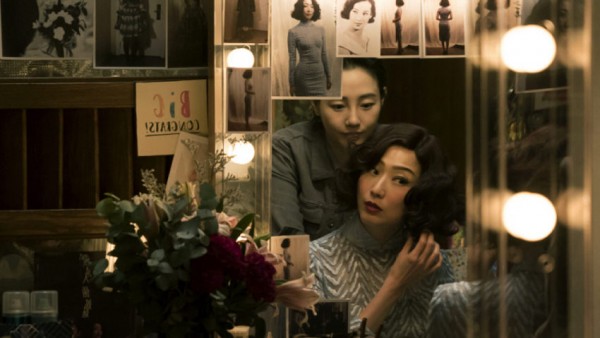
Unusually detailed IMDb summary HERE.
Audiences looking for the next “Crazy Rich Asians” might take some delight in Stanley Kwan’s diva-licious “First Night Nerves,” a “Feud”-like behind-the-scenes rivalry which forces center stage all the drama between high-maintenance Hong Kong actresses Yuan Xiuling (Sammi Cheng) and He Yuwen (Gigi Leung). Set during the final week of rehearsals for a new play called “Two Sisters,” the film feels soapier than a broken dishwasher, but that’s not necessarily a bad thing for audiences who relish the chance to watch actresses display their full range of emotion in a movie that gives even the smallest female parts more dimension than most movies offer their ostensible leading ladies.
One of Hong Kong’s only openly gay directors, Kwan has crafted a movie that’s nearly Almodóvarian in the appreciation and respect it showers upon ladies of all classes — not just the city’s Ferrari-driving super-elite, but also the loyal assistants who cook and console our dueling stars.
-Peter Debruge, Variety
People often say that the heyday of Hong Kong cinema is gone. The Hong Kong film here refers to films made in Cantonese language, through Hong Kong studios, directors, and subsided by Hong Kong capital. The directors and actors who led the Hong Kong film industry have headed to Hollywood or started their new journey in mainland China, not their home, after finishing their mission.
Stanley Kwan, who once was a symbol of Hong Kong cinema and who led Hong Kong’s New Wave movement, questions this common notion. He talks about a new way of making films that Hong Kongers can go to with his film First Night Nerves.
- Marie Lee, Asian Movie Pulse
First Night Nerves, 100 mins., debuted at Busan Oct. 2018; also shown at Singapore Dec. 2018. Now included in the San Francisco Film Festival.
SFFILM showtmes:
Thu, Apr 11 at 8:00 pm BAMPFA (EVENT HAS PASSED)
Sat, Apr 13 at 7:30 pm SFMOMA Phyllis Wattis Theater (EVENT HAS PASSED)
Fri, Apr 19 at 1:00 pm YBCA - AT RUSH!
Last edited by Chris Knipp; 04-15-2019 at 07:16 AM.
-
HARVESTERS, THE/DIE STROPERS (Etienne Kallos 2018)
ETIENNE KALLOS: THE HARVESTERS/DIE STROPERS (2018)
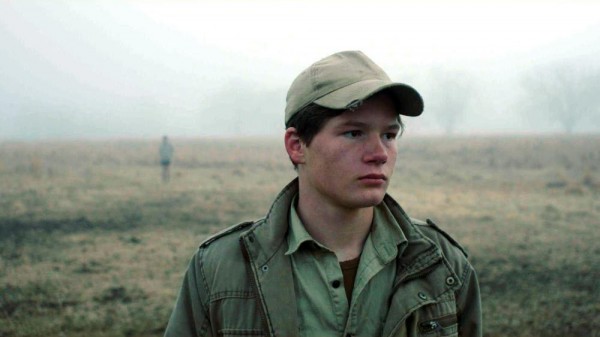
ALEX VERMEULEN IN THE HARVESTERS
[PREVIEW ONLY]
A brooding Afrikans debut
South Africa, Free State region, isolated stronghold to the dwindling Afrikaans white ethnic minority culture. In this conservative farming territory obsessed with strength and masculinity, Janno is different, secretive, emotionally frail. One day his mother, fiercely religious like the whole family, brings home Pieter, a hardened street orphan she wants to save, and asks Janno to make this stranger into his brother. The two boys start a fight for power, heritage and parental love. The film got a standing ovation at its debut in Un Certain Regard at Cannes. In the lead as Janno, beefy and rugby-playing but soft-faced youth Alex Vermeulen is a feat of perfect casting, and as his sudden opponent Pieter, Alex van Dyk isn't far behind. The Greek-descent director, who grew up in the Free State, and has won awards for shorts, returned home for this moody debut with its unique grand, harsh landscape and minimal music. This strange world reminded me of Carlos Reygadas' Silent Light (NYFF 2007). For some background see here; for aVariety review by Guy Lodge, here.
SFFILM showtimes:
Sat, Apr 20 at 6:30 pm Roxie Theater
Sun, Apr 21 at 3:45 pm Roxie Theatre

ALEX VAN DYK AND ALEX VERMEULEN IN THE HARVESTERS
Last edited by Chris Knipp; 04-12-2019 at 03:46 PM.
-
HONEYLAND/ Медена Земја (Tamara Kotevsk, Ljubomir Stefanov 2018)
TAMARA KOTEVSK, LJUBOMIR STEFANOV: HONEYLAND/ Медена Земја (2018)
Review originally published for New Directors/New Films (Apr. 3 & 5)
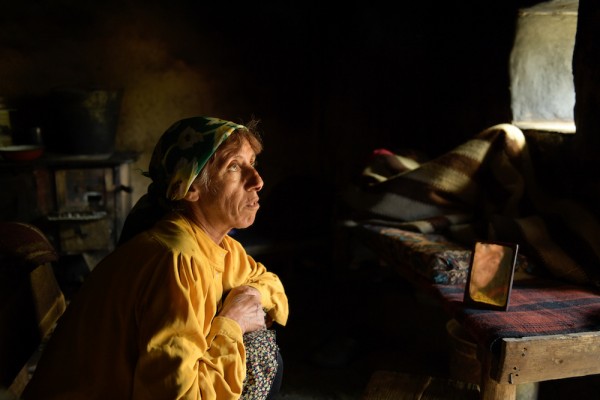
HATIDZE MURATOVA IN HONEYLAND
No matter how remote, your environment is in danger
Austere but rich, Kotevsk and Stefanov's Honeyland is one of the most immersive and atmospheric documentaries you will see this year. No narration is necessary. This film has only the limitation of its restrictive life. At the center of it, living in an abandoned Macedonian village, is Hatidze or Atidze Muratova, a small, tough birdlike woman of 55 with an easy smile, lined face, and big crooked teeth who tends her bee colonies with expertise and respect and her mother, with whom she lives, out of love and duty. Her mother Nazife is 85, not planning on dying, "just making your life misery," she says, declaring she's become a tree. She is half blind and does not stretch or go outside.
Hatidze is busy. What she does is wild beekeeping, or bee hunting, in hives she finds behind slabs of stone. Her easy skill with bees is clear, her respect for the sustainability of her task. She removes the combs like books from a shelf, easily, gently. She is cooperative, non-invasive. Look how she is with her skinny graceful dog at the very end of the film. She has a knack for nature that's almost elegant. She is good also with people, trading fairly and confidently to shopkeepers in the market in the capital, Skopje, touting the healthy and medicinal quality of her honey. Hatidze is a good person.
What a bare life this is. Comforts are dye for Hatidze's hair, tying it up with a nice scarf with rocky village chic, favoring yellow and green, a fan for her mother, and a little transistor radio hooked up once to a small speaker atop a pole she tries to broadcast music, but she gets only snatches of a song here or there. Herself, she sings. She cries and calls and sings to the bees when when she is working them.
The film is the result of three years of shooting by this team. As will happen with diligent documentarians, the reward of a significant event arrives: new neighbors appear with a dinky, antique trailer, seven unruly kids, and a bunch of calves. The man, Hussein Sam, takes up bee keeping too, but despite Hatidze's advice, never learns the way of it, or will not, because he is greedy for instant rewards and has not the necessary patience and respect that nature requires. We learn from Hatidze that you take half the honey and leave the other half to the bees. This maintains the balance. Take too much, and the bees will die, or attack Hatidze's bees. Sam takes too much, and both things happen.
One of the boys bonds with Hatidze. He understand them and respects her way with them. "If I had had a son like you. . . " she says. But his family doesn't understand the balance. But the neighbors are a nightmare. They are lazy and quarrelsome and the do serious damage. Their rampages cause the destruction of a lot of Hatidze's bees, their own, and, finally many of their young calves die due to the fat wife's carelessness. All goes wrong, angering even Hatidze's quiet mother. "May God burn their livers" is one of her last declarations. And then, after all their damage, they pick up and leave. Perhaps nature will regain its equilibrium again somehow. At the end, Hatidze's seen looking forward, alone, hopeful, strong.
This simple film is nonetheless superb and hard to improve upon. Kudos to the cinematography of Fejmi Daut and Samir Ljuma with its naturally gorgeous compositions of rocky hillside, animals, and ruined village architecture, the deep color of the clothes and gnarly skin in the market, the clear natural light. Much respect also to the filmmakers Tamara Kotevsk and Ljubomir Stefanov for their personal human sense of the observational documentary style, which makes this film so memorable.
Honeyland, 85 mins., debuted at Sundance (reviewed there by Guy Lodge for Variety and by Shiri Linden for Hollywood Reporter). Reviewed for New Directors/New Films, now showing in the San Francisco Film Festival.
SFFILM showtimes:
Sat, Apr 20 at 1:30 pm - BAMPFA- AT RUSH!
Fri, Apr 19 at 6:00 pm Victoria Theatre - AT RUSH!

HATIDZE MURATOVA IN HONEYLAND
Last edited by Chris Knipp; 04-12-2019 at 05:43 PM.
-
IN MY ROOM (Ulrich Köhler 2018)
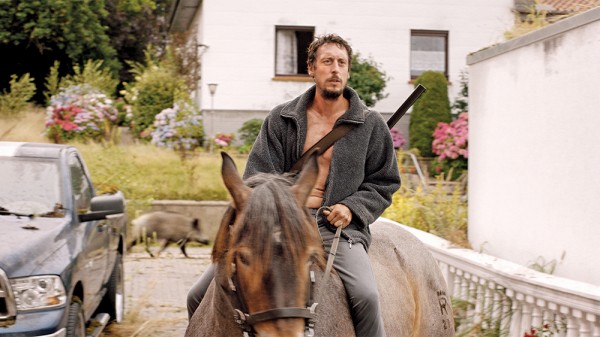
HANS LÖW IN IN MY ROOM
Muddling toward heroism
While I had trouble getting a grip on Köhler's previous film, the 2011 Sleeping Sickness (NYFF), this everyman-in-the-apocalypse tale, inspired, the director says, by three books,* goes down very easy, strange though it is. And after all, you want a last-man-living tale to be strange; otherwise why bother to make another one? We're with the Berlin School here, and Köhler's wife is Maren Ade, whose Toni Erdmann was one of the School's films recently celebrated at Cannes, as was this, and Valeska Grisebach's Western. These have all been included in NYFF's, by the way.
What's fresh here to start off with in the first of three segments, the slouchy protagonist, Armin (Hans Löw), doesn't do things that are going to seem meaningful or ironic when he wakes up and there's no living other soul on earth to be found. He's a tall, slightly slobby boychild, approaching middle age but a flop as a freelance TV cameraman covering local politics. He's so bad, the wittily absurd opening segment is a lengthy clip of jerky footage where he was confusing the "on" and "off" buttons of his telecamera and would up turning it off when the politicians gave their speeches and on when nothing was happening. He seems to make the dance club scene and he fails miserably to stage a one night stand with a lady his age. No wonder: he's a slob.
Armin takes a break (an autobiographical moment, Köhler has said) in the country helping his father take care of his dying, bedridden grandmother. Köhler delivers an almost alarming degree of banality-plus-specificity throughout all segment. It also goes on a tad too long by the standards of setups for conventional sci-fi apocalypse tales. This heightens our sense of the banality, and the suspense (assuming we know the genre we're watching).
Then comes the middle section, with its stunning leap. After Armin wakes up and can't find anybody alive, he flails aroudnd for a while, exploring empty shops, breaking into grandma's house. Her corpse is there and he finds a radical solution to that. He gets drunk. Most notably, he has an inspiration and a solitary moment of grand wildness. He steals a Lamborghini painted with racing insignias and drives at breakneck speed through all the winding streets of the town dodging scattered cars. Here production designers Jochen Dehn and Silke Fische excel, providing a wealth of motorcycles on highways scattered like dead beetles, big trucks diagonally abandoned, all sorts of signs of sudden disappearance of humanity.
The film gets a shot of adrenaline with its little sudden jump forward to Robinson Crusoe Armin, pot belly gone, tan and buff and flat-bellied, out at a farm he has set up in what he later explains is the area where he grew up, with livestock, chickens and a horse and at work on setting up a hydroelectric generator on a local stream, though somewhat inexplicably, there seems to still be water and light freely available from the usual public supply. Now, Armin not only looks good. He has a purpose in life, and seems happy. Just as Köhler reveled in his protagonist's humdrum urban quotidian, he now delights in the classic gestures of self sufficiency in nature. And this is obviously a choice. Armin could have survived on the edge of leftover civilization, off the abundance of consumable products, off canned food. But no. He will dig up potatoes, raise hens, shoot game.
In the last segment, Kirsi (carefully chosen Italian actress Elena Radonicich) appears, driving a small camper. Though Armin still has a car, he seems to prefer cultivation and travel via his trusty workhorse. She's attractive. And now, Armin is attractive too, both in his physical looks and in the machismo of his functionality in this new world. So here they are, Adam and Eve, and they look good. But of course it doesn't turn out that way. Köhler has said he chose Radonicich because she seemed like a woman who has lived alone independently for five years. They have sex, plenty of it. But when Armin suggests they make a baby, Kirsi balks. "Would you want to bring a child into this world?" she asks. "I love this world," he answers (a wonderfully resonant line, richer than it looks in print). "You don't," Kirsi says, "you just love fucking!" So gradually ends the idyll.
The New York Film Festival blurb last fall spoke of this film's "meticulous details and sly, subtle ironies," and its the interplay between the two that makes this a fresh and resonant work. It's also essential somehow that most of these Berlin School films tend to go on "too long." They create their own real time pace, as was notably the case with Maren Ade's Toni Erdmann. I have the feeling that I missed the point of Sleeping Sickness, an essence the judges got at Berlin that year to award it the Silver Bear. Here, I'm pretty sure rewatching would yield plenty of awards. The main actors are very interesting.
__________
*He has cited Arno Schmidt's Black Mirror, Marlen Haushofer's The Wall, and David Markson's Wittgenstein's Mistress as inspirations.
In My Room, 119 mins., debuted at Cannes Film Festival (Un Certain Regard) 17 May 2018, and showed in at least a dozen other festivals including Karlovy Vary, Munich, Jerusalem, New York, Busan, Göteborg, Rotterdam, and San Francisco, as part of which it was screened for this review.
SFFILM showtimes:
Sat, Apr 13 at 8:15 pm BAMPFA
Sun, Apr 14 at 8:00 pm SFMOMA Wattis Theater
Last edited by Chris Knipp; 03-22-2023 at 02:00 PM.
-
THE LOAD/TERET (Ognjen Glavonić 2018)
OGNJEN GLAVONIĆ: THE LOAD/TERET (2018)
(Originally published for New Directors/New Films)

LEON LUČEV IN THE LOAD/TERET
A Serbian trucker's grim ride: a stoical look at an ambiguous journey
This atmospheric, wintry road movie by Ognjen Glavonić concentrates on a truck driver who must convey sensitive cargo along a treacherous path, from Kosovo to Belgrade during the 1999 NATO bombing of Yugoslavia. Reference to Henri-Georges Clouzot’s classic Wages of Fear of Friedkin’s remake Sorcerer is obvious but so is the difference: this driver has an unknown load, and papers permitting him to pass without opening it up to authorities. This is not a high tension journey with deliciously unbearable suspense, but rather one of slow, brooding, tedious nerve-wracking-ness and the growing sense that Vlada (Croatian actor Leon Lučev), the driver, has gotten involved in some unspecified but considerable evil. The oblique but insistent reference is to an atrocity, a late Kosovo war massacre, that Glavonić meticulously documented earlier in his 2016 non fiction film, Depth Two. Ognjen Glavonić is a person in intense pursuit of secrets his countrymen want to forget.The director has said "every country is built on crimes that they don’t want to talk about." The load: the very burden Vlado carries is weighted down with metaphorical conceit that, despite the minimalism of the style, feels lugubrious and heavy-handed.
On the journey not much happens but each small incident is magnified. Vlada picks up a young hitchhiker (Pavle Čemerikić) on his way to Munich. He stops to rest several times. He telephones to his wife, who's having hospital tests. He gets his cigarettes and what turns out to be a historic lighter stolen during a brief absence from the truck. The camera briefly leaves Vlada, following the hitchhiker to an abandoned playground where his name is painted (a goodbye to his youth, perhaps?) watched two young petty thieves examine the stolen lighter.
At the end of the film, Vlada meets with his son, Ivan, and tells him a wartime grandfather Leka cigarette lighter story that's less colorful, but may remind you of the gold watch story told by Captain Koons (Chris Walken) in Pulp Fiction. In a Film Comment interview with Eric Hynes, Glavonić says everything must lead up to the father's opening up to his son in this sequence. A nice touch, the walnut tree that grew out of the fallen Leka's pocket. There was actually a medal, a watch and a lighter awarded posthumously to Leka after WWII.
The ending is hopeful, with the teenage Ivan liking his dad's "friend's" band tape and sharing with his sister the thought that he needs to form a band of his own. But he won't escape the burden of these days he doesn't yet know about - not if Ognjen Glavonić has anything to say about it.
The Load/Teret 98 mins., debuted at Cannes in Directors Fortnight May 2018; over 1 5 other festivals including Toronto, Vancouver and Rotterdam. Reviewed at Cannes by Jessica Kiang for Variety (she calls this feature debut "harshly intelligent and uncompromisingly spare"), and by Stephen Dalton for Hollywood Reporter. Dalton comments pointedly that this film "should find a keen audience among the the misery-porn masochists who program and attend film festivals," but will be only "very niche commercial prospect, especially for non-Balkan viewers." A pessimistic view of a well-crafted film in which, indeed, not enough finally happens. Screened for this review as part of the 2019 MoMA-FSLC New Directors/New Films Series.
Now showing as part of the 2019 San Francisco Film Festival.
SFFILM showtimes:
Thu, Apr 18 at 6:00 pm - Roxie Theater
Sun, Apr 21 at 6:00 pm - BAMPFA
Mon, Apr 22 at 3:30 pm - Victoria Theatre
Last edited by Chris Knipp; 04-15-2019 at 07:21 AM.
-
LORO (Paolo Sorrentino 2018)
PAOLO SORRENTINO: LORO (2018)

TONI SERVILLO IN LORO
Berlusconi squared
So here it is, Paolo Sorrentino's latest masterpiece, a feat of glorious filmmaking, and it's a grotesque portrait of Silvio Berlusconi, the ultra-rich, charming, crooked several-time PM of Italy, who's currently jockeying for reentry into the corridors of power in Italy, surrounded by scandals and crimes and eighty years old. And this is another incredible performance in the lead role by Sorrentino's long-time collaborator, Toni Servillo, and one of his most amazing. It may rival his work in the earlier Il Divo and The Great Beauty/La grande bellezza.But this is a "visceral, grotesque and graphically vulgar portrait" of Berlusconi (Deborah Young, Hollywood Reporter).
I love he texture scene-to-scene of this extravaganza, which is every bit up to the standard of the director's previous efforts. But it's also a a bit of a mess, or arguably, giving its ambition, a big mess. To begin with, there were two parts, Loro I and Loro Ii, and this is a blend and a reduction, resulting, in the view of some, in an augmentation of the worst aspects of each of the two parts (Deborah Young thinks so). There is also the moral issue, or the point of view. Like that tasteless critique of tasteless wealth, Crazy Rich Asians, this is a movie in love with the very things it set out to criticize. Secondo Deborah, this truncated version clarifies each of the two main narrative threads, Berlusconi's breakup with his wife of 26 years, Veronica Lario (played by Elena Sofia Ricci), vs. the effort of a businessman, Sergio Morra (Riccardo Scamarcio, excellent) to line up "il presidente" with a bunch of bikini-clad, coke snorting champagne quaffing young ladies - a crass modern seraglio, in effect a specialized custom prostitution ring. But at the same time the shorter version only underlines that these two don't have much to do with each other and the movie as a whole isn't going anywhere.
I'd also like to comment on the frequent linking of Sorrentino with Fellini, who's said to be his inspiration and master. Fellini may have lived in better times. But Fellini would not make a movie anything like this. He created fantasies, full of inspiration and personal style. His work is fundamentally brimming with humanity. Instead, there is a cold, hard edge to Sorrentino's work that is utterly un-Felliniesque, despite the similarly elaborate, carnivalesque, and very Italian texture. Watching Loro with one's head full of Fellini is an amazement and a sadness. With its constant scenes of the exploitation of young women's bodies, it could also be totally indigestible to advocates of the #MeToo movement, not to mention all the drugs and excess, which might disgust anyone - though one swallowed that in the glorious ronde of La Grande Bellezza, because it all had a point, as the representation of an addiction to pleasure and distraction.
Nonetheless, this shows that Italians can still make amazing cinema. The acting is superb. Servillo is astonishing (that face, that grin! those endlessly complicated speeches to the lady he sells the apartment to, to prove he's still the greatest salesman in Italy), but Scammarcio is a surprise. If you thought he was just an aging pretty boy, wow! He embodies the crooked, addicted, greedy, star-struck young man with the bevy of prostitutes he's out to sell with utter conviction. The score is a delight. The southern Italian songs - sung by Servillo, too! and all the music, including opera. The production values are awesome. The scanty costumes of the babes! The splendid villas! the TV in SB's living room, giant and set in a handsome golden frame! Every scene is a new potential astonishment. But - this has been an issue before with Sorrentino - there is the issue of the structure, and the question, What the heck is all this supposed to be saying? Does anybody know? I'm not saying this is porn; and so what if it were? But remember Crazy Rich Asians. He comes to satirize and stays to celebrate.
Perhaps this viewpoint is explained in a summary of the film by Sorentino himself which says it describes a "synthetic view of things" by Berlusconi that "potrebbe definirsi amorale, decadente, ma straordinariamente vitale" - "could be described as amoral, decadent, but extraordinarily vital." Absolved.
Loro I opened in Italy 24 Apr. 2018, Loro II 10 May; Loro, 13 Sept.]shown in various festivals, including Toronto. The combined version to be shown as part of the San Francisco Film Festival, where it was screened for this review.
SFFILM Showtimes:
Sat, Apr 20 at 3:00 pm Castro Theatre
Last edited by Chris Knipp; 09-25-2019 at 04:04 PM.
-
MIDNIGHT TRAVELER (Hassan Fazili 2019)
HASSAN FAZILI: MIDNIGHT TRAVELER (2018)
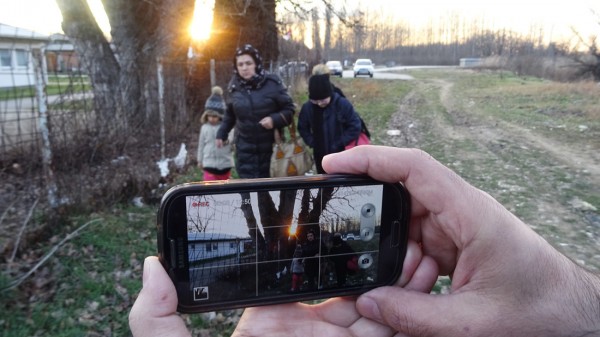
[PREVIEW ONLY]
The long way out, on cell phones
When the Taliban put a bounty price on the Afghan director and "Art Café" owner Hassan Fazili's head, he was forced to flee with his wife and two young daughters. Denied asylum when in Tajikistan, deported back to Afghanistan, they decide fo flee to the West. This is how he shot his two-year journey o Europe with his wife and three young children, using only three cell phones to do the camerawork. The elder of the two girls, Nargis, is full of verve and imagination, wife Fatima Hussaini is a filmmaker too and a tough and vibrant woman. At some point they lose their patience and weep or burst with anger but the children still manage to play and be happy. Iran is a brief relief. Turkey a way-station. Bulgaria is ugly: there are attacks on refugees. A long stay in Serbian camp. (In between countries and camps they're on the run, and they have a horrible experience with a people-smuggler.) Some of the images are beautiful, many hum-drum. Fazili's professionalism and stamina as a filmmaker with such limited means are impressive throughout this long and patient slog. As a Hollywood Reporter review notes, there are lacunae and "seams" showing, and Fazili him self is somewhat absent as a personality.
Midnight Traveler, 90 mins., debuted at Sundance Jan. 2019; also Berlin and CPH:DOX, and the San Francisco International Film Festival, where it was screened for this preview. At the San Francisco awards, Midnight Traveler won the McBaine Documentary Feature Award with a $10,000 cash prize.
SFFILM showtimes:
Wed, Apr 17 at 6:30 pm SFMoMA
Thu, Apr 18 at 3:00 pm Creativity Theater
Fri, Apr 19 at 5:30 pm Berkeley Art Museum/Pacific Film Archive
Last edited by Chris Knipp; 04-22-2019 at 01:28 PM.
 Posting Permissions
Posting Permissions
- You may not post new threads
- You may not post replies
- You may not post attachments
- You may not edit your posts
-
Forum Rules





 Reply With Quote
Reply With Quote








Bookmarks